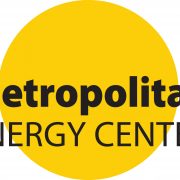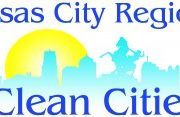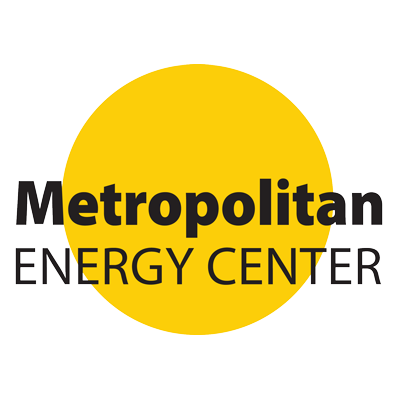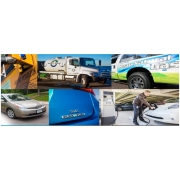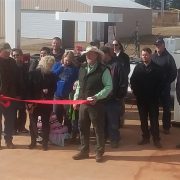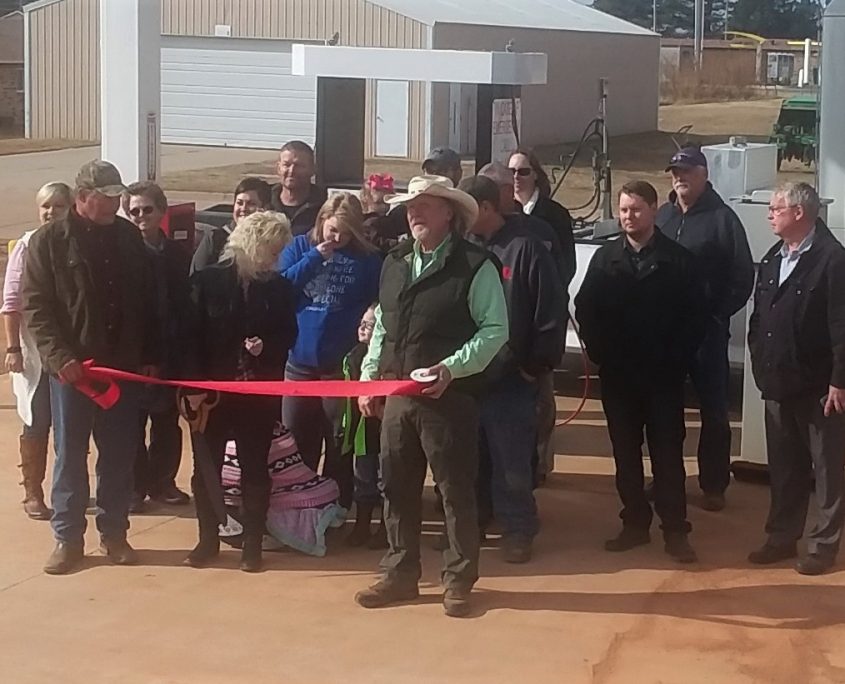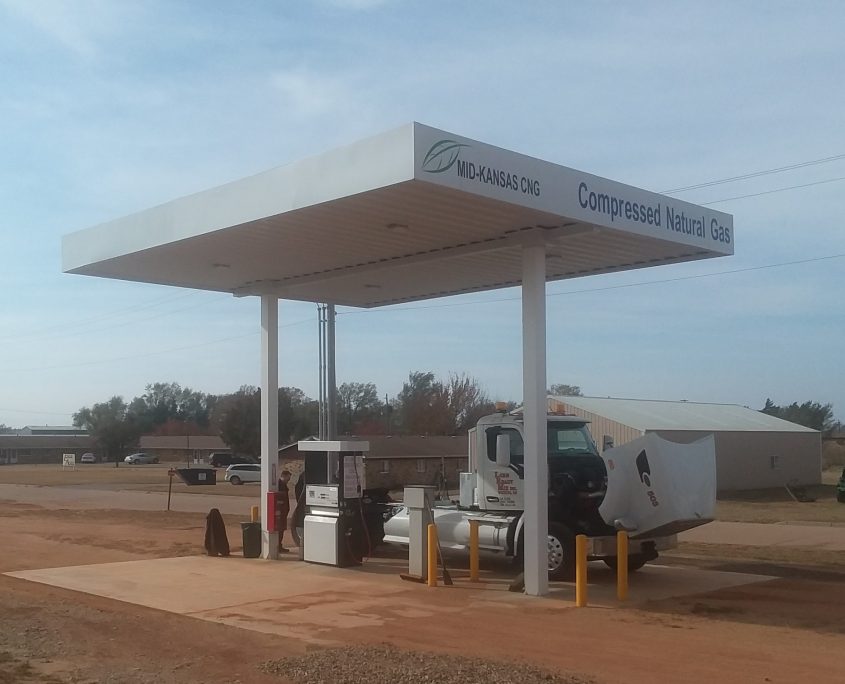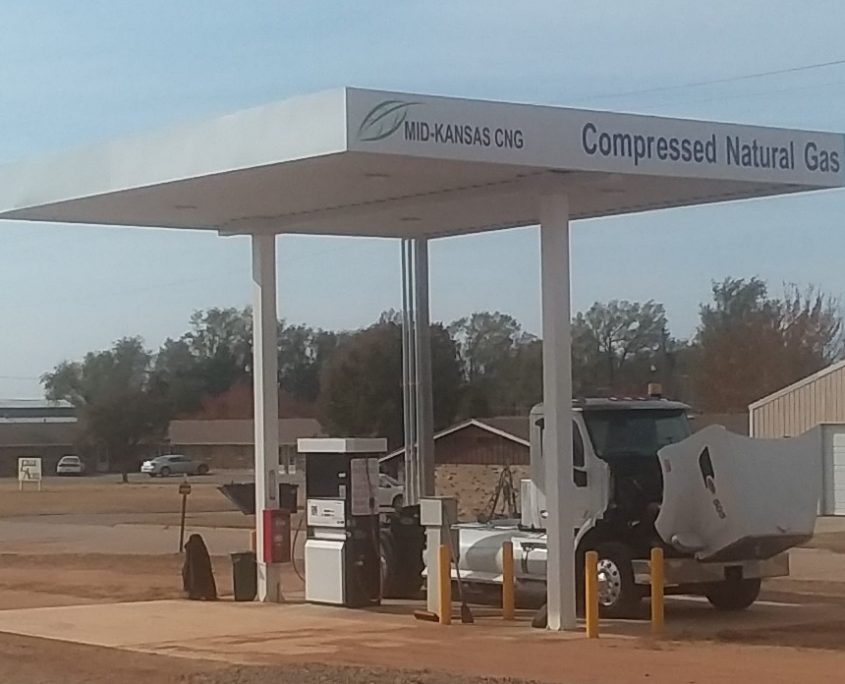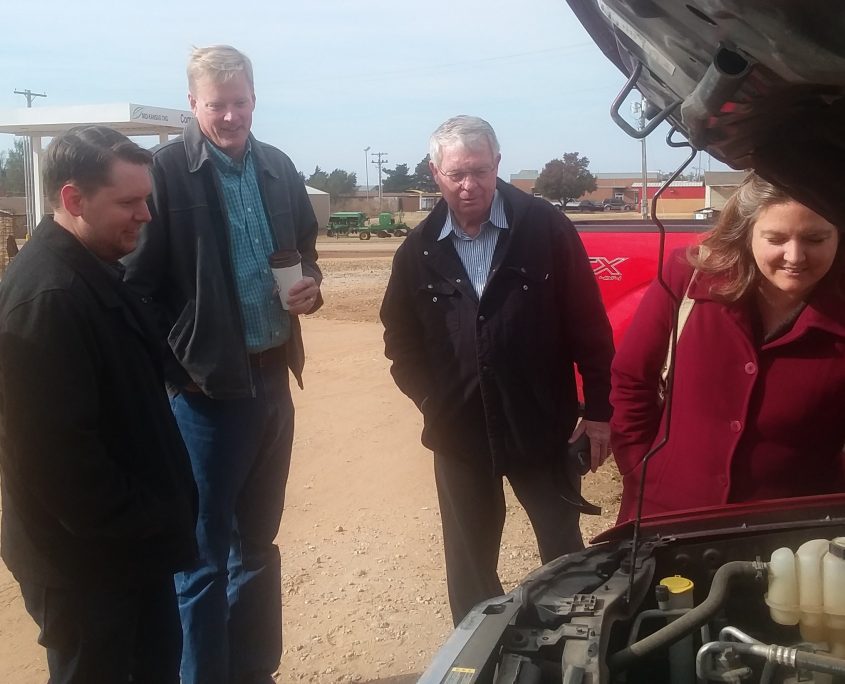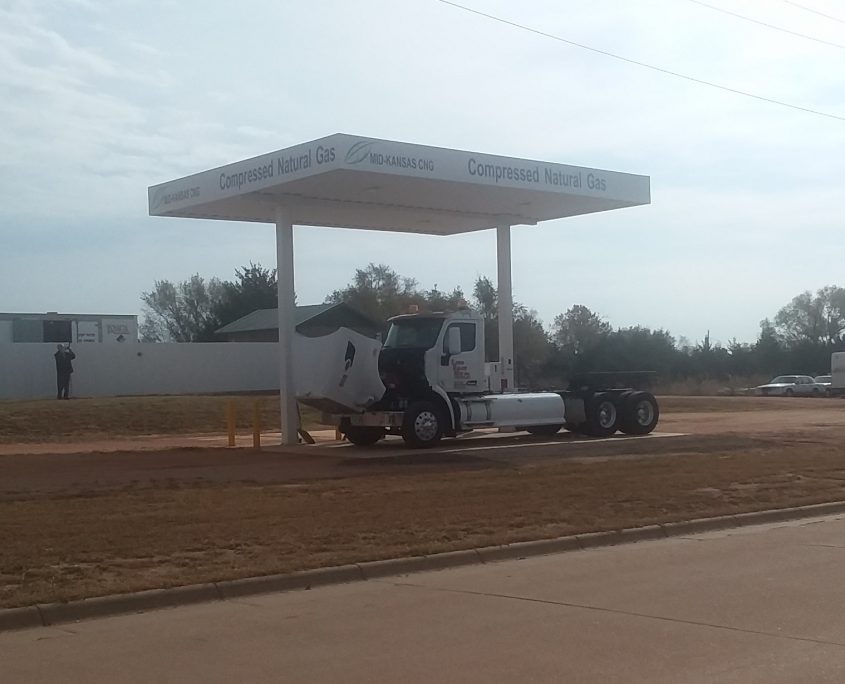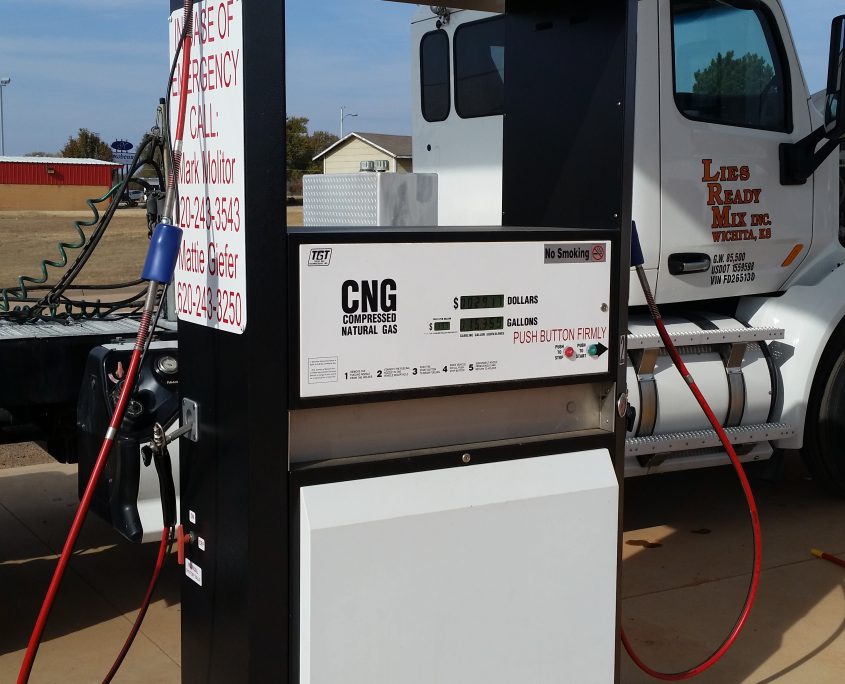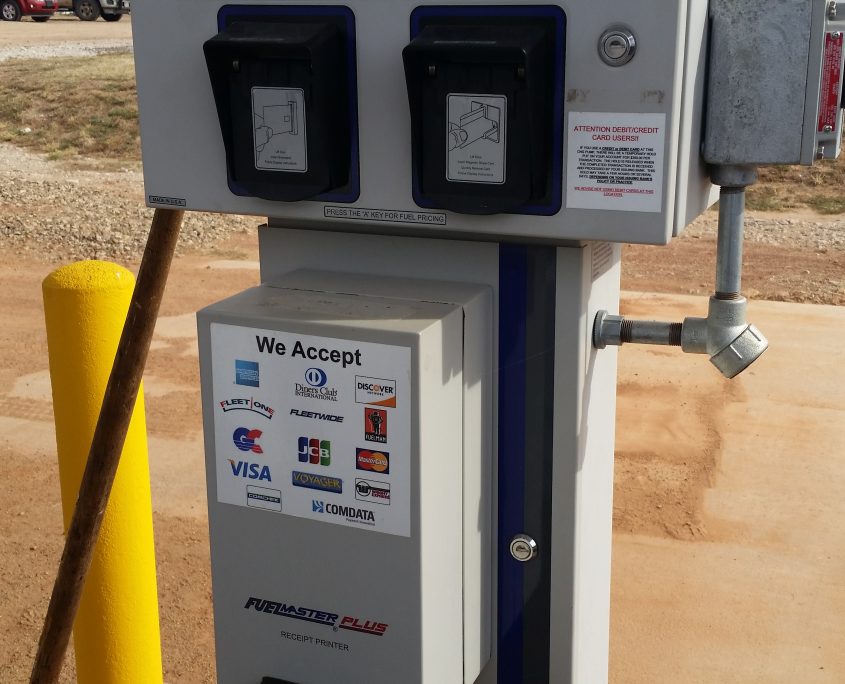Dear Director Brunetti, Mr. Watson and Ms. Waters:
Metropolitan Energy Center, Kansas City Regional Clean Cities and Central Kansas Clean Cities appreciate the opportunity to submit comments on behalf of our members and stakeholders regarding the Kansas Department of Health and Environment (“KDHE”) draft mitigation plan for the use of the funds available to Kansas under the Volkswagen Environmental Mitigation Trust (“EMT”).
Our overall goal is to ensure that investments made by KDHE through the EMT result in meaningful, long-term and cost-effective reductions in nitrogen oxides (“NOx”) and other polluting emissions from Kansas’ transportation sector, and that new alternative fuel projects are feasible to carry out under the program rules.
First, we would like to thank KDHE for undertaking a public process prior to developing the draft plan. Numerous elements of the draft are excellent – especially noteworthy is your intent for using the DERA option – and we offer the following recommendations for the Draft Mitigation Plan to maximize the impact of EMT funds:
• Ensure fair access to funds across both urban and rural areas. The draft plan states that KDHE anticipates offering most opportunities statewide, but at the same time may list priority areas based on larger NOx emissions. About 32% of Kansans live in rural areas, higher than the national average . The DERA option may be particularly beneficial for school bus fleets serving rural areas, which must travel longer distances between students than urban areas.
• Give priority to alternative fuel replacements by limiting diesel replacements. Diesel replacement funding is at the same reimbursement rate as alternative fuels in some categories. Under section 3 of the initial spending plan breakout KDHE proposed to provide 25% of the total cost to replace an eligible diesel engine, regardless of what type of engine with which it is replaced. Alternative fuel vehicles and electric vehicles (AFVs and EVs) typically have greater up-front costs than traditional diesel, which is a disincentive for fleets to buy-in when they can get the same reimbursement for a less expensive diesel replacement. Specific recommendations:
>> Require all diesel engines purchased – for replacement or repower, for mobile or stationary – to be B20 compatible, where B20 is a blend of 20% biodiesel with 80% ULSD.
>> Provide greater funds in all categories for alternative fuel and electric compared to their diesel equivalents. Alternatively, limit diesel replacements to two per application, but allow a greater number of replacements (up to 10) per applicant for new alternative fuel projects. Fleets that commit to alternative fuel often phase in this investment over three or more years. Allowing larger numbers of AFV will permit this approach. It also generates greater NOx reduction by stimulating the use of cleaner engines faster.
>> Especially in certain low-speed and stop-start duty cycles, diesel engines do not perform up to their modeled EPA emission standard. Provide for higher reimbursement rates in your final plan and/or in your RFPs for alternative fuel trash haulers but also for other AFV replacements in low-speed and stop-start duty cycles.
>> Allow for diesel replacements only on older vehicles (MY2002 or earlier).
• Use the HDVEC emission calculator for RFP evaluations. On page 8, section D, you mention use of DEQ for simplified purposes of assigning emission values to project types. However, for evaluating RFP submissions on a qualitative basis, we recommend using the Heavy-Duty Vehicle Emissions Calculator (HDVEC) for the most up-to-date alternative fuel emission data. These data are incorporated into tools built and managed by Argonne National Laboratories and are updated as frequently as feasible when new data comes available. Argonne recently released this new tool based on its GREET and AFLEET models, as well as on EPA’s MOVES model. If electric generation and transmission emissions are to be considered in the calculation, production and transport should be considered for the other fuel options, as well.
From the HDVEC web site : “The Heavy-Duty Vehicle Emissions Calculator (HDVEC) was developed to estimate the vehicle operation nitrogen oxide (NOx) and particulate matter (PM2.5), as well as the well-to-wheel greenhouse gas emissions (GHGs) of commercially available alternative fuel medium- and heavy-duty vehicles. This tool is ideally suited to aid fleets and decision makers when comparing vehicle technologies for emission reductions and to consider allocation of funding.
“The tool can calculate results for 3 project types:
• Environmental Mitigation w/ Scrappage
New alternative fuel versus new diesel, plus additional benefit from early retirement of scrapped vehicle.
• Environmental Mitigation w/ Repower
Vehicle after repower versus diesel vehicle before repower
• Clean Vehicle Replacement
New alternative fuel versus new diesel.
“The first two are specifically for environmental mitigation projects such as those funded under the Clean Diesel Settlement or the Diesel Emission Reduction Program, while the third provides results without the scrappage benefit.”
• Confirm beneficiaries are primarily based in Kansas. Due to the nature of vehicles and the high density of Kansas’ population residing near the Kansas-Missouri border, there will, of course, be some usage of repowered and replaced vehicles across state lines. However, it is important to prioritize KDHE’s VW settlement funds for Kansas-based fleets. This can be measured by applicants providing justification that at least 50% of their fleet’s run time is within Kansas.
Thank you for the opportunity to comment and for all your hard work on behalf of Kansas citizens.
Signed,
Kelly Gilbert
Executive Director, Metropolitan Energy Center
Coordinator, Kansas City Regional Clean Cities Coalition
Tami Alexander
Program Coordinator, Metropolitan Energy Center
Coordinator, Central Kansas Clean Cities Coalition
ENERGY SOLUTIONS HUB with Metropolitan Energy Center can help you save on energy costs and live in a more comfortable climate year round.
“Speed Greening” – Speed Dating, Energy Efficiency style!
Media contact: Beth Pauley, beth@mec.bluesym10.work
Tuesday, August 21st
402-469-4091
Kansas City, MO – Metropolitan Energy Center is joining Kansas City Power & Light, Spire Energy, and fellow energy enthusiasts to host a “speed greening” happy hour! Speed Greening is the energy efficiency equivalent of speed dating, where guests will have the opportunity to meet their choice of energy solutions vendors in a quick, informal round-table.
Kansas City residents are becoming accustomed to extreme weather patterns, and these energy efficiency measures will decrease the overall environmental impact your energy use has in the community. Best of all, they are cost-efficient and will eventually pay for themselves.
This is a great way to simultaneously tackle your costs and slow the future effects of climate change by reducing your building’s greenhouse gas emissions.
This event will also introduce you to the MEC’s Energy Solutions Hub, which is a metro-wide continuation of the great work the Kansas City Energy Project began to improve the energy efficiency of buildings in Kansas City. Ticket price includes admission as well as refreshments, including happy hour beverages.
Although our Energy Solutions Hub is new, we have been local leaders for energy efficiency for 35 years. If you cannot attend the networking event and want more information on how you can live in a comfortable climate without burning your pocket book, contact Sara (Sara@metroenregy.org). We can help you develop a request for proposals to send out to potential auditors, evaluate their responses, schedule your audit, and file your rebate.
Wed, May 23 | 2:30 pm | Project Living Proof | 917 Emmanuel Cleaver II Blvd, KCMO
Kansas City Regional Clean Cities is hosting a grant workshop on three new funding opportunities totaling more than $140 million nationwide. These programs cover diesel emissions reduction, low- and zero-emission transit fleets, and infrastructure and super-fast charging, plus other projects. We’ll cover eligibility, the application process, financial and cost-share requirements, and much more in this free workshop.
All interested potential grant applicants are cordially invited to participate. This includes state and local governments, transit agencies, MPOs, non-profit organizations and school districts. Although for-profit companies are not eligible to apply directly for these grants, Clean Cities routinely works with our corporate fleet members to administer grants for their projects. Interested businesses are welcome to attend.
Join us in person at Project Living Proof, or attend virtually via GoToMeeting or telephone at (646)749-3122, Access Code: 448-679-701. If attending in person, please park at the Anita Gorman Discovery Center, 4750 Troost Avenue, Kansas City, MO, then follow the boardwalk north to PLP’s back door.
For questions or to RSVP for the workshop, email David Albrecht or call (816) 531-7283.
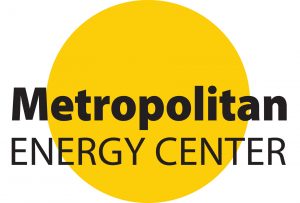
The Missouri EV Collaborative held its second spring meeting on April 17th at City Hall in Columbia, MO. There was plenty of discussion among municipal fleet and Clean Cities representatives from Missouri, Nebraska, Iowa and Illinois. The VW Settlement, clean fuel corridors and the nuts and bolts of EV charging were all hot topics.
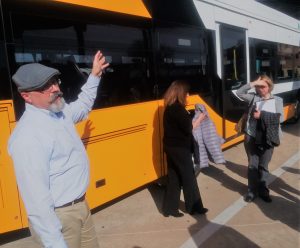
Above – Transit Manager Drew Brooks Lays Out The Layout Of An EV Bus
The really fun part, though, came at the end of the day, when attendees headed out for a test ride on one of nine all-electric transit buses run by the city’s transit authority. GoCOMO now operates nine battery-powered buses, with four more ordered. The bus, California-built but designed by China’s BYD, provided a remarkably quiet ride around town as Parking & Transit Manager Drew Brooks talked about tech, testing and transitioning to EV bus service.
The City runs the buses under a lease-to-own agreement as part of GoCOMO’s budget. Along with local funding, a $1.7 million grant from the Federal Transit Administration is helping to cover the cost of electrical upgrades, consulting and three of the four EV buses still on order. The cost difference between all-electric buses and conventional models is still substantial, though EV prices are falling. This means that ROI in through fuel savings is very much a long-term proposition. However, there’s one area where the electric buses paid for themselves immediately – maintenance. Normal quarterly maintenance for a diesel bus runs in the neighborhood of $1,300. But an EV bus, without fuel or oil; in fact, lacking nearly all of the moving, greasy parts found in a diesel bus – runs about $300 per maintenance check.
According to Brooks, BYD’s support team engaged well before a single wheel turned in mid-Missouri. Along with background information on local weather and passenger counts, route mapping was vital to the rollout. This included special attention to the maximum grades on each route. This information was then programmed into the computer on each bus before delivery to cut the odds of running out of juice. Although different drivers can and do make a difference with how many miles a given bus can run between charges, range hasn’t really been a serious issue.
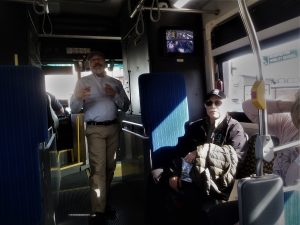
Above – Drew takes questions on the road; on right, KCMO Sustainability Coordinator Gerry Shechter.
One notable physical difference during our drive around town – the lack of noise, something that’s made the EV buses popular among riders. Drew stood up front, taking questions in a voice just slightly louder than normal conversational tone, something that would be impossible in a diesel bus. There may have been 75 horses tied to each rear axle, but you couldn’t really tell from the passenger seat.
Each year, KC Regional Clean Cities collects data from stakeholders and produces a coalition report for the U.S. Department of Energy. This report reflects all of the great sustainable transportation efforts of our members. It also provides opportunities for funding sustainable transportation projects, helps promote our coalition and showcases all your fleet has done to reduce your carbon footprint. Whether your organization operates a fleet of alternative fuel vehicles or organized a carpool, we want to hear about it!
Emails requesting information on your efforts to displace petroleum use in transportation have been sent. Contact us if you didn’t receive yours.
We’ve created a spreadsheet to make it easier for you to send us your information. There are eight tabs on the spreadsheet, but you will only need to fill out those that apply to your organization or business. In most situations, 2-3 tabs with just a few lines of information will be sufficient. We are requesting that surveys be returned via email by Friday, March 2 to one of the addresses below.
As always, any information you share with us will be kept confidential. Your individual responses are not shared with anyone outside the DOE or Clean Cities staff. Any reports that are released publicly will contain only aggregated data on petroleum displacement by all respondents.
If you have any questions about the survey, please don’t hesitate to contact us at 816-531-7283 or by emailing your Program Coordinator.
KC Regional Clean Cities Stakeholders contact David Albrecht at david@mec.bluesym10.work
Central Kansas Clean Cities Stakeholders contact Tami Alexander at tami@mec.bluesym10.work
On February 22nd, the KC City Council passed Council Member Taylor’s resolution to protest President Trump’s proposed budget cuts to 22 arts and science agencies. This action followed Wednesday’s listening session hosted by the EPA regarding repealing the Clean Power Plan. Several city, state, and federal elected officials weighed in on the importance of Kansas City continuing its focus on clean energy. Perhaps the most powerful statement came from Congressman Cleaver when he spoke about the health of his three year old grandson, saying “I’d like him to be able to breathe; I don’t think that’s too much to ask.”
Since 1983, Metropolitan Energy Center has worked with government agencies, businesses, and citizens to promote environmental health through energy efficiency training, fuel alternatives, and more. This year, MEC is working with various stakeholders across Kansas and Missouri to aid the adoption of fuel alternatives to curb the usage of fossil fuels. Numerous studies indicate that fossil fuel usage is the largest contributor to climate change, and curbing fossil fuel usage improves the health of residents as well as the economy. Since the federal government is signaling a different set of funding priorities, MEC is prepared to continue these programs through the support of our community members.
We are excited to see the community rally behind clean energy and look forward to the community’s continued participation in clean energy initiatives. As Mayor Sly James said, Kansas City is high on the list of cities that have made strides to combat climate change, and it is imperative that local and state communities continue to decrease climate change activities to protect future generations.
On Friday, November 10, Mid-Kansas CNG celebrated the Grand Opening of a new compressed natural gas (CNG) fueling station at 636 Thompson Street in Kingman, with a ribbon cutting by the Kingman Area Chamber of Commerce and a luncheon. Owners, Mark Molitor and Mattie Giefer, hosted the event, along with representatives from Central Kansas Clean Cities (CKCC) and KGS, which featured demonstrations of CNG refueling and a tour of the station’s compressor system. The station is open to the public 24 hours daily for refueling of CNG vehicles from autos to tractor-trailers.
Mattie Giefer was looking for a cheaper fuel option for his fleet of vehicles with GCI Construction and turned to Mark Molitor, who is in the oil & gas business, for a solution. Together they formed Mid-Kansas CNG to fulfill the need for natural gas fueling in the Kingman area. After consultation with area trucking companies, a location on the US-54/US-400 corridor was selected. The station will fill a CNG fueling gap between Wichita, 50 miles to the east, and Garden City and Liberal, both about 175 miles west. Molitor and Giefer believe that CNG is a more economical and better environmental choice for transportation. They are open to inquiries about fleet fueling on the site.
About Us
Metropolitan Energy Center (MEC) is a 501(c)(3) nonprofit organization. Our mission is to create resource efficiency, environmental health, and economic vitality in the Kansas City region – and beyond. Learn more about us and our programs.
Recent Posts
- Spring Cracks Open at Project Living Proof
- Future Work Is Here: Can We Take the Offer?
- Kansas City’s Agora: Safeguarding our Library as a Sanctuary and Beacon of Innovation
- Kansas City’s Future Depends on Smart Energy and Transportation Investments
- Driving Rural Innovation: Orange EV’s Push for USDA Support


